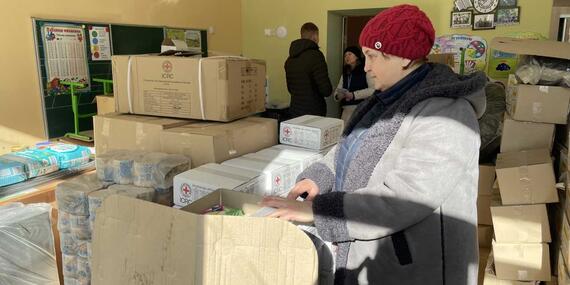Today's top news: Ukraine, Sudan, Myanmar

Ukraine
We are concerned that hospitals and other health facilities in the country are being hit almost daily. These attacks are putting health services at risk for millions of people, particularly those living near the front lines.
On Tuesday this week alone, at least three health facilities in the Donetsk region were reportedly damaged. This was on both sides of the front line, according to both Ukrainian and Russian-installed authorities.
Since Russia’s full-scale invasion of Ukraine 15 months ago, the World Health Organization (WHO) has verified more than 1,000 attacks on health facilities in the country, causing 240 deaths and injuries among health workers and patients.
As a result, up to 50 per cent of health facilities in eastern and southern Ukraine are not functional.
So far this year, we and our humanitarian partners have reached nearly 3 million people with emergency health services and medicines, with plans to reach 8 million by the end of 2023.
Today, we delivered enough medicine to treat some 2,000 civilians remaining in the community of Preobrazhenka, just 5 km from the frontline in the Zaporizhzhia region.
We organized the convoy which delivered food, clean water, emergency shelter kits and construction and hygiene materials. These supplies were provided by the International Organization for Migration (IOM), the UN Children’s Fund or UNICEF, the UN Refugee Agency or UNHCR, WHO and the NGO, World Vision International.
Sudan
IOM says that more than 1.2 million people have been displaced inside Sudan as a result of the conflict. IOM’s estimates are based on preliminary reports from field teams, while additional reports are likely to emerge as humanitarian access improves.
Meanwhile, we and our partners continue to deliver aid wherever and whenever we can.
As we mentioned yesterday, the World Food Programme (WFP) has started distributions in Khartoum State, reaching some 15,000 people trapped in Omdurman with emergency food.
Across the country, WFP has reached more than 782,000 people with food and nutrition support over the past four weeks.
The agency is also providing emergency telecommunications services to all UN agencies and the wider humanitarian community in Sudan, where basic connectivity remains challenging.
And the UN Population Fund has started to provide life-saving medicines and reproductive health supplies to the maternity hospital in Wad Medani in Aj Jazirah state. Medical teams at this hospital are also providing reproductive health services to women and girls who have fled from the capital, Khartoum.
Myanmar
Two weeks after Cyclone Mocha made landfall, we and our partners have distributed shelter and other relief items to more than 63,000 people and over 230,000 people have received food assistance.
While humanitarian workers continue to ramp up support where they have authorizations and available stocks, wider access for distributions and approvals for the movement of supplies are both urgent.
Shelter needs continue to be a priority as the monsoon season approaches.
Our colleagues on the ground also warn that the food reserves for households affected by the cyclone are dwindling and communities are facing rising food prices.
